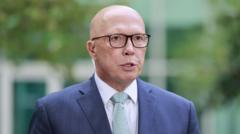Dutton's apology follows criticism of proposed job cuts and plans targeting public sector work-from-home options
Australia's Opposition Leader Withdraws Controversial Work from Home Policy

Australia's Opposition Leader Withdraws Controversial Work from Home Policy
Peter Dutton acknowledges backlash and reaffirms commitment to flexible work arrangements
In a significant policy reversal, Australia’s opposition leader, Peter Dutton, has decided to abandon his previous commitment to end work from home arrangements for public servants. The change comes in response to notable backlash from various sectors, particularly concerning the potential impacts on women.
During a press conference on Monday, Dutton expressed regret for the proposed policy, declaring, "We got it wrong and we have apologised for it." As part of a broader strategy ahead of the upcoming elections on May 3, the Liberal-National Coalition had originally bundled the work-from-home ban with plans for extensive job cuts within the public sector, aimed at enhancing operational efficiency.
Critics, including members of the incumbent Labor government, argued that the proposal would disproportionately affect female workers who often rely on flexible work arrangements. Dutton clarified that the ban was intended specifically for public service employees in Canberra, though he criticized the portrayal of the policy by opponents as a misrepresentation.
Shadow finance minister Jane Hume reinforced that the Coalition would now maintain current flexible work options, framing it as essential for maximizing workforce productivity. In addressing the contentious proposal to reduce public service jobs by 41,000 to finance other initiatives, Hume acknowledged the need for better communication regarding the approach to achieving these cuts—indicating a preference for measured reductions through hiring freezes rather than forced layoffs.
Despite Hume's reassurances, Dutton's earlier comments suggested ambiguity regarding the approach to job cuts, indicating the coalition's need to clarify its position in forthcoming days. Meanwhile, the Labor Party is seizing the opportunity to critique the Coalition's fluctuating policies. Employment Minister Murray Watt lampooned Dutton's efforts to reshape his public image, asserting that policy shifts cannot alter an individual's intrinsic character.
On a global scale, some leaders have been attempting to tighten control over workplace flexibility. For example, US President Donald Trump had mandated a return to full-time office work for government employees upon his return to office. However, such measures resonate less favorably in Australia, where current polls indicate that concerns over the cost of living remain the top priority for voters, overshadowing discussions around workplace policies.
During a press conference on Monday, Dutton expressed regret for the proposed policy, declaring, "We got it wrong and we have apologised for it." As part of a broader strategy ahead of the upcoming elections on May 3, the Liberal-National Coalition had originally bundled the work-from-home ban with plans for extensive job cuts within the public sector, aimed at enhancing operational efficiency.
Critics, including members of the incumbent Labor government, argued that the proposal would disproportionately affect female workers who often rely on flexible work arrangements. Dutton clarified that the ban was intended specifically for public service employees in Canberra, though he criticized the portrayal of the policy by opponents as a misrepresentation.
Shadow finance minister Jane Hume reinforced that the Coalition would now maintain current flexible work options, framing it as essential for maximizing workforce productivity. In addressing the contentious proposal to reduce public service jobs by 41,000 to finance other initiatives, Hume acknowledged the need for better communication regarding the approach to achieving these cuts—indicating a preference for measured reductions through hiring freezes rather than forced layoffs.
Despite Hume's reassurances, Dutton's earlier comments suggested ambiguity regarding the approach to job cuts, indicating the coalition's need to clarify its position in forthcoming days. Meanwhile, the Labor Party is seizing the opportunity to critique the Coalition's fluctuating policies. Employment Minister Murray Watt lampooned Dutton's efforts to reshape his public image, asserting that policy shifts cannot alter an individual's intrinsic character.
On a global scale, some leaders have been attempting to tighten control over workplace flexibility. For example, US President Donald Trump had mandated a return to full-time office work for government employees upon his return to office. However, such measures resonate less favorably in Australia, where current polls indicate that concerns over the cost of living remain the top priority for voters, overshadowing discussions around workplace policies.




















